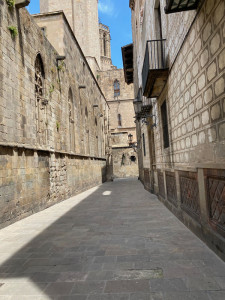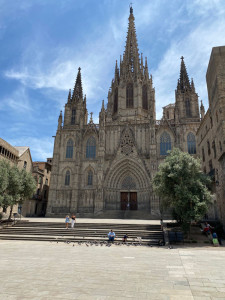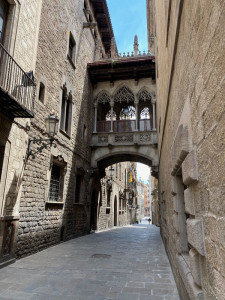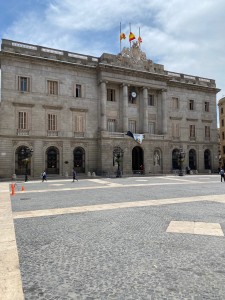Кілька днів тому редакція журналу «Всесвіт» отримала гострий філософський есей нашого постійного автора Бориса Фінкельштейна, який мешкає в Іспанії.
Письменник осмислює перший день у Барселоні після пом’якшення карантину, а також ставить питання про те, яким може бути життя на планеті після завершення епідемії.
Спонукаємо наших читачів долучитися до дискусії про майбутнє людства після пандемії коронавірусу. Пропонуємо англомовній аудиторії журналу “Всесвіт” есей Бориса Ф інкельштейна в перекладі Майкла Пурсґлава.
інкельштейна в перекладі Майкла Пурсґлава.
Borys Fynkelshteyn
Our World after COVID-19 Lockdown
Part 1
Today May 25th in Barcelona is the first day of the move from “tough” quarantine to the first stage of a softer quarantine. There will be three more stages before life returns to normal, if things pan out favourably. Meanwhile the world is without people. Where before there were heaving throngs, now there are merely occasional passers-by in face masks, carefully avoiding one another. Man has finally realised that he is the source of infection.
Everything the same, but no people. Why such fear? After all deadly epidemics have been encountered more than once in earlier periods of our history. But when they did, the churches were not closed. Is it possible there is a problem with belief in eternal life? Even the church, even it…
Now many people are wondering what the world will be like after the pandemic, and will there be a world?
It is difficult to answer but it will certainly be different.  Perhaps we needed this pause for an understanding of our place in the world. Meanwhile, we were simply destroying this world in our own narrow interests. Perhaps this virus is Nature’s answer.
Perhaps we needed this pause for an understanding of our place in the world. Meanwhile, we were simply destroying this world in our own narrow interests. Perhaps this virus is Nature’s answer.
Who knows how many “answers” it will give.
You were mulling over the simple assumption that our civilisation is not the first in the history of mankind. After all it is only just over 5000 years old.
But how long has Man been in existence? From 100 to 300 thousand years. And Man does not have claws, fangs or wool. Man depends on an artificial; environment and on weapons made by himself. That means that evolution has removed everything else as being unnecessary. Or is Man not the product of evolution?
Nevertheless how fragile is the world of Man? We self-confidently alter the course of rivers and change the climate but we cannot resist even small changes in the ambient environment. But have we not got carried away?
We must reconsider values. The consumer world must go. It was a dead end. But – here is a way out. We must look into ourselves. At present there is no cure, but not everyone dies, because we have inner strengths and unrealised opportunities. Every human being is really a whole world, or, to be more accurate, a multitude of worlds. We long ago learned to exist in equilibrium both with viruses and microbes. This is where the reserves of development are, both in the microworld and the macroworld, both within us and outside us.
both with viruses and microbes. This is where the reserves of development are, both in the microworld and the macroworld, both within us and outside us.
God created Man in his own image but, in creating artificial intelligence in his turn, Man tries to repay him in like fashion.
At the centre of any future world must be Man, his inner world, his communicative possibilities. That is, if we interpret the signal correctly If not, then it will be repeated in one or other form.
This is a question of survival and so we must not misstep.
Part 2
Before and after. These are different hypostases, but they have something in common. It’s you and I, if we’re lucky… We would like kindness and concern, but from whom can we expect such treatment? From medics? They must be protected – after all they are people too. From politicians? As an Odessa relative of mine said: “Don’t make me laugh”. You know, we have to think of ourselves. And since, in a period of a mortally dangerous epidemic, “about ourselves” means “about the whole of humanity”, everyone must think. It is a rare event when we have a common enemy and it’s not ourselves. I used to think that humanity had a fairly robust system of health care and medical science, and a system for running these at both national and global level, in the shape of the WHO. I do not think that now.
The epidemic has been spreading since December 2019, five months ago. And in this time what have these “organs”, taken together, recommended for us: face masks, social distancing and…hand washing. And they say, honestly enough, that there is no specific medicine, no vaccination. Treat yourself as things turn out – symptomatically. And the main thing is quarantine. Many may not know that the word comes from the Italian “quaranta”, meaning forty. That is, if you survive forty days then if it’s your fate, you’ll die and if not, you’ll live and cease to be a threat. Our distant ancestors knew this. The notorious quarantine has wrecked the economy and left millions without work but it has not stopped the epidemic. Now everyone is anxiously awaiting a second wave. Why is everything so bad? We… didn’t you know? We made assumptions long ago. Go to any film library. Every second film is about an epidemic. Does that mean we’d guessed rightly? Why was nothing done, or too little done? Our own squabbles are more pressing than the health of humanity in general. His could end badly. I feel that Nature’s answer may not be its last by a long way. We all know that our political system, at least that part which calls itself democratic, has three strands of power, the legislative, the executive and the judicial, which a formally independent of one another. However, the more authoritarian the regime, the more they are interd ependent and dependent on the regime. I think we must finally rid ourselves of the illusion that they are capable of defending us from this or any future epidemics. We must create a fourth strand of power – global health care and ensure it is fully independent of politicians. After all, politicians are just people, and even sometimes fall ill, not merely to enhance their own image. The WHO is useless for this task; it can’t even give us proper statistics. It has become too dependent on others and has turned into a bureaucratic structure. Its role in repelling COVID-19 was out of all proportion with the money spent on it. I think the question must be asked of each and every one of us. We all take part in the creation of our human world and we all have a right to life. We are not only ourselves, not only countries, nations, cities and villages. We are people, members of the human race. We should have a collective instinct for self-preservation or we will disappear, like many forms of life have done before us. We thought that the basic problems were pollution and global warming, but there turned out to be many more. No one will be forced into this organisation, association or whatever name it may be given in the future; everything will be purely voluntary, but in the future maybe those who reject it will not be preserved physically. But everyone must clearly understand: if we spend on future life at least as much as we have spent on future death (military expenditure), we will live longer and richer lives. Believe me.
ependent and dependent on the regime. I think we must finally rid ourselves of the illusion that they are capable of defending us from this or any future epidemics. We must create a fourth strand of power – global health care and ensure it is fully independent of politicians. After all, politicians are just people, and even sometimes fall ill, not merely to enhance their own image. The WHO is useless for this task; it can’t even give us proper statistics. It has become too dependent on others and has turned into a bureaucratic structure. Its role in repelling COVID-19 was out of all proportion with the money spent on it. I think the question must be asked of each and every one of us. We all take part in the creation of our human world and we all have a right to life. We are not only ourselves, not only countries, nations, cities and villages. We are people, members of the human race. We should have a collective instinct for self-preservation or we will disappear, like many forms of life have done before us. We thought that the basic problems were pollution and global warming, but there turned out to be many more. No one will be forced into this organisation, association or whatever name it may be given in the future; everything will be purely voluntary, but in the future maybe those who reject it will not be preserved physically. But everyone must clearly understand: if we spend on future life at least as much as we have spent on future death (military expenditure), we will live longer and richer lives. Believe me.
But what do you think?
Translated by Michael Pursglove



